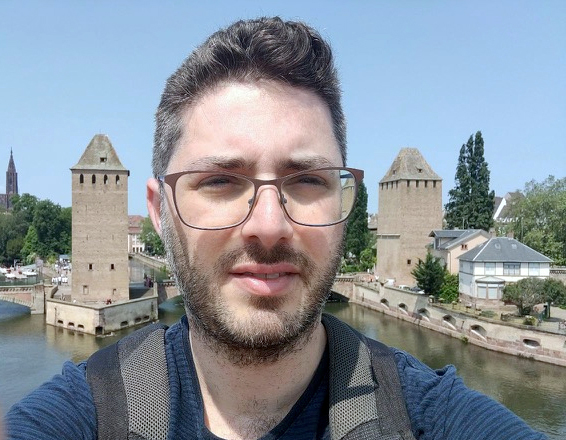New Head of the Computer Engineering Program: Prof. Ran Gelles

Prof. Gelles specializes in distributed computing and coping with errors, failures and interferences in computations performed over networks with multiple computers. He recently developed a method for overcoming defects that disrupt an entire network
In one of his latest studies, Prof. Ran Gelles dealt with a scenario that, in light of recent events, does not seem too far-fetched: What happens when the entirety of information sent over a network, in each of the communication channels, is distorted during communication. “We imagine an extreme scenario that could happen if, say, Iran successfully attacks the network, or if there’s a severe electromagnetic disturbance that affects all of the transmissions sent over the communication channels (for instance, to/from the satellite or cell tower). If we can handle such an extreme scenario, we can cope with countless real disruptions on a smaller scale,” explains Prof. Gelles. “We were able to develop a method that allows us to do any computation we like, solely based on the fact that some form of communication took place – an email was received, even if it said nothing significant. Since there is no content information in the messages themselves, we have to rely solely on the order in which messages are received, as well as the identity of the computer from which they were sent. This is a wholly chaotic situation, and to find a solution we must have one leader computer from which computation trickles down to all other machines.”
Prof. Gelles has a B.Sc. in computer engineering (Technion) and pursued his academic career studying computer science (Technion, UCLA). He joined the Faculty of Engineering at Bar-Ilan in 2016. He specializes in distributed computing, specifically coping with errors and interferences. “Distributed computing is about performing computations when multiple computers are involved – like the internet, cloud computing, or autonomous vehicle fleets such as drones, with each drone being an independent computer that has to work together with the others to perform a task without anyone to control them. I’m interested in learning what happens when one of these computers crashes or starts transmitting faulty information (intentionally or unintentionally), and how we can stop this single error from disturbing the entire network.”
Last year, Prof. Gelles spent a sabbatical in Germany, attending Paderbon University and CISPA research institute, where he researched electing a leader for a distributed network under the presence of severe errors. “Electing a leader can be a difficult task even when there are no network errors. In this project, conducted in collaboration with three CISPA students who enjoyed my lecture on the subject and approached me about it, we showed how to elect a leader, despite the severe errors disrupting the contents of every message,” he shares. During that year, he formed professional relationships with additional research groups in Sweden, France, and Germany. “In one of the studies, co-executed with a research group from the University of Lyon in France, we showed how to perform computations over dynamic networks: networks that are constantly changing. A computer joins the network, another one disappears, communication lines get disconnected, and computers dynamically connect with other computers on the network – just like we see with the internet.”
In September, Prof. Gelles returned to Israel and in October he assumed his new role as head of the computer engineering program. “Computer engineering is a fascinating field that relates to every electronic system around us, because every electronic system is in fact a computer: smart watches, drones, satellites, smart TVs, and certainly larger infrastructures such as cloud computers and computer networks. Computer engineering sits at the intersection of computer science and electrical engineering, and considers the system from both a software and hardware aspect, with emphasis on how they connect. It is a unique perspective that gives a significant edge to graduates and great versatility that also affects their market value. Computer engineers have a double advantage: they can take on software and programming positions, including real-time and embedded programming, and they can also find roles that are more oriented towards the electrical engineering aspect, such as developing hardware, chips, processors, electronic cards and system engineering. It’s very in demand. Hi-tech companies are all desperate for computer engineers.”
The program’s 15 faculty members specialize in various fields such as distributed computing, artificial intelligence, hardware and cyber, cryptography, data processing and computer graphics (“If you’re thinking about working for Disney, this is the place to be”). The program offers a new track, hardware and chip design, headed by Dr. Leonard Yavits. The track focuses on hardware right from the get-go, unlike other tracks in which only third-year students choose their focus – hardware design, cyber security, networks and computing, or data processing and analysis. “The computer engineering program is the second largest in the faculty, and accepts 100 undergraduate, graduate, and postgraduate students each year,” says Prof. Gelles.
“Additionally, we have more than a few international students who have chosen to come to Israel and attend the Faculty of Engineering at Bar-Ilan. During the COVID period, I had a postdoctoral student from India; today he’s a professor at IIIT-Delhi. This year we have a master’s student from Turkmenistan, who I will be co-supervising with Prof. Carmit Hazay. These students come here because our program is on an international level, and our researchers publish groundbreaking research in leading journals and conferences. My aspiration is to see the program grow even more. There aren’t many like it in Israel, not many programs tackle so many fascinating specializations and give students a broad view of all aspects of hi-tech system development. Most importantly, it’s the only program that allows students to simultaneously specialize in both hardware and software.
Last Updated Date : 28/03/2024



